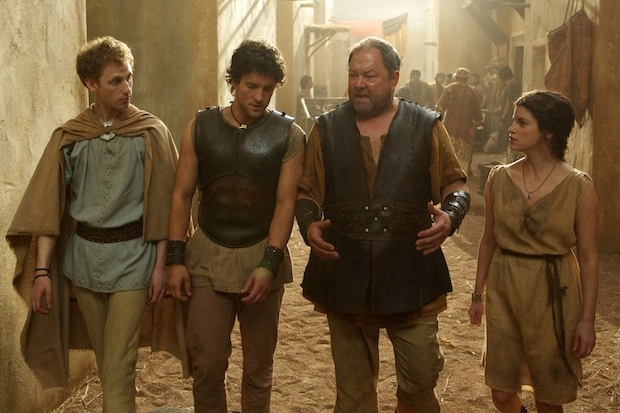This week saw the final episode of possibly the greatest television series ever. Breaking Bad wasn’t made by the BBC, of course. Nor, so far as I know, did it make any attempt to buy the broadcast rights. That’s because, obviously, the Beeb has far more important, special things to spend your compulsory licence fee on, in keeping with the Reithian tradition. Stuff like Atlantis (BBC1, Saturday).
Atlantis was designed to fill the Saturday evening family entertainment slot that has previously been occupied by Merlin. And I do mean ‘designed’. It’s so crudely manufactured it makes One Direction look like Led Zeppelin. It’s as ersatz as a cup of acorn coffee in 1944 Berlin, as authentic as Jordan’s breasts — and if ever I catch any children of mine enjoying it then it’s off to China with them to have their organs harvested.
When Merlin came out, I think I may have touched, briefly, on the pain a man suffers when he has been to Oxford and read Malory’s Le Morte d’Arthur — plus all the relevant Tennyson — only to find the whole of Arthurian legend traduced, cheapened and travestied by a screenwriting mate who hasn’t had the benefit of so fine an education but who ends up making gazillions by cannily giving Merlin and Arthur boy-band haircuts and reinventing them for the Teletubbies generation.
Well, Atlantis is more excruciating still. At least Merlin had the virtue of being loosely inspired by classic legend. Atlantis, on the other hand, appears mainly to have been inspired not so much by Greek myth (from which it nonetheless borrows shamelessly and indiscriminately) as by Merlin at its most cheesily derivative: the dashing young hero; the nerdy sidekick; the high-ranking female love interest; the stern king; the wise magician; the men running round with swords; the monsters; the jarring mix of faux-archaic language with contemporary yoof-speak.
All right, prime-time kiddie TV drama needs its archetypes. Hence, for example, the series’ opening premise: diving in a submarine in search of his lost father, Jason (Jack Donnelly) finds himself in Atlantis, and is rapidly given to discover that he is, in fact, a native of the lost city, and that, aided by his remarkable acrobatic and sword-fighting skills, he is the chosen one whose task it is to do something jolly important…
Nothing wrong with that: even if it is the same basic plot as Harry Potter, Star Wars, Lord of the Rings, The Matrix, Merlin, and so on, it is a satisfying trope, tested by time, with which all solipsists, young and old, can identify. But why does Atlantis have to be so obvious about it? Before Luke Skywalker got handy with his light sabre he had to go through weeks of arduous training; ditto Neo in The Matrix. Jason, on the other hand, arrives with his powers good to go, as he discovers the moment he’s attacked by lions and finds that, no problem, he can just leap balletically into the air, spin round a handy beam and pirouette out of danger.
You might argue that with family entertainment you need to keep things basic. But is this actually true? The Simpsons is abundant with sophisticated jokes that go straight over younger viewers’ heads but which make grown-ups feel appreciated; at no point when writing Lord of the Rings, you suspect, did Tolkien ask himself: ‘How can I take the very best of what I know about Old Norse and Old English literature — and then fashion a turd thereof?’ Atlantis, on the other hand, appears quite determined to treat any viewer possessing more than half a brain cell with Olympian contempt.
The nerdy sidekick is called Pythagoras, by the way. When first we meet him he is drawing pictures of geometric patterns. ‘You’re the triangle guy,’ declares Jason, accurately but depressingly. Has our civilisation really come to this: the man celebrated for the past 2,500 years as one of history’s great mathematical theorists now gets reinvented as the light comedy interest in a crap kiddie TV ancient myth mash-up so contemptuous of its sources it has Jason (instead of Theseus) kill the Minotaur, and turns Hercules (Mark Addy) into a lovable porcine berk?
Now, briefly compare and contrast how difficult Vince Gilligan found it to get Breaking Bad commissioned: rejected out of hand by HBO (makers of The Sopranos), kept on ice by the FX channel, then rescued, flukily, by the pay-per-view channel AMC. Gilligan found it such a struggle not because his concept was bad but because it was considered by most of the idiots in charge of deciding what we do and don’t get to see on our screens too bold, too subtle, too original to capture the popular imagination.
Atlantis, on the other hand, I’m sure, was commissioned after barely a moment’s consideration. Our civilisation is doomed, I tell you, doomed.







Comments